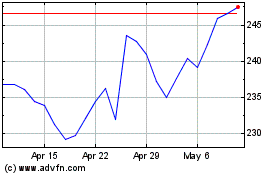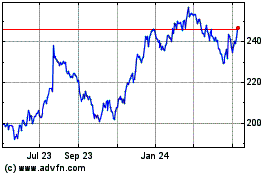By Paul Page
Sign up: With one click, get this newsletter delivered to your
inbox.
A global trade downturn doesn't appear to be slowing the drive
for bigger container ships, at least in one corner of the sector.
South Korea just launched the world's biggest boxship in turning a
vessel capable of carrying 24,000 20-foot boxes over to flag
carrier HMM, the WSJ Logistics Report's Costas Paris writes,
providing a mammoth demonstration of Seoul's aggressive support of
key national industries. It may be awhile before the ship termed a
megamax can test the limits of its capacity. The vessel is
launching into a depressed global trade market, with operators
canceling hundreds of sailings and idling droves of ships. Industry
observers say megaships are leaving Asian ports half full these as
coronavirus pandemic restrictions crush demand in Western
economies. South Korea is more focused on its domestic economy,
where shipbuilding is a major employer and a key target for $33
billion in rescue funds for major industrial sectors.
TRANSPORTATION
U.S. freight railroads are hunkering down to wait for better
days, whenever those come. CSX Corp. and Union Pacific Corp. have
taken hundreds of locomotives offline in recent weeks, reduced the
number of trains in their networks and sent workers home, the WSJ's
Paul Ziobro reports, as the declining shipping economy tests the
rail lines' ability to align their networks with freight demand.
Both carriers are using creative labor arrangements to keep workers
on staff without furloughs or layoffs, measures they say will allow
them to call back workers quickly as demand warrants. Both
railroads reported higher first-quarter profits as labor and fuel
costs dropped faster than the decline in shipments and revenue.
They'll be pressed to maintain that efficiency: Union Pacific
expects rail volumes to fall 25% in the near term, and
industry-wide figures show demand across a range of commodities is
already falling close to that rate.
QUOTABLE
E-COMMERCE
Amazon.com Inc. is getting closer to its third-party sellers'
business than the company is supposed to. Employees of the
e-commerce giant have used data about independent sellers on its
platform to develop competing products, the WSJ's Dana Mattioli
reports, a practice at odds with the Amazon's stated policies. In
one instance, Amazon employees tapped into documents and data about
a bestselling car-trunk organizer sold by a third-party vendor, and
the company's private-label arm later introduced its own car-trunk
organizers. The actions revealed in interviews and documents go to
the heart of a sometimes-troublesome relationship between Amazon
and the independent vendors on its marketplace. The online
retailing giant asserts it doesn't use information from the site's
individual third-party sellers in developing its private-label
products. But employees say Amazon's restrictions on access weren't
uniformly enforced and that using such data was a common
practice.
SUPPLY CHAIN STRATEGIES
China's supply chain for medical goods is turning into a
free-for-all. Agents for foreign governments, hospitals, businesses
and an army of middlemen are descending on the country to secure
ventilators and masks and other protective gear, the WSJ's Liza Lin
and Eva Xiao report, creating scenes of disarray marked by
million-dollar deals and little certainty that purchases will lead
to deliveries. Chinese factories are taking advantage, dictating
buying conditions and demanding advance payments in full, while
buyers must quickly vet newly-minted vendors. One healthcare
executive who's effectively leading a procurement team calls it
"very much a wild, Wild West" scene. The chaos underscores how
desperate U.S. and other buyers have become to secure medical gear.
Even when expensive deals can be made, shipping remains a problem.
Regulatory hurdles make the products' export difficult, and China
has limited foreign airlines' flights, reducing cargo capacity and
sharply driving up airfreight rates.
IN OTHER NEWS
Surveys show business activity across the U.S., Europe and Japan
collapsed in April. (WSJ)
American workers have filed more than 26 million unemployment
insurance claims in the past five weeks. (WSJ)
A sharp rise in oil prices extended a period of outsize moves in
global energy markets. (WSJ)
Mexico's inflation pulled back from March to April. (WSJ)
Daimler AG's first-quarter earnings fell 80% and operating
earnings at Daimler Trucks fell by nearly half to $266 million.
(WSJ)
Flatbed specialist Daseke Inc. named Jason Bates as its new
finance chief, hiring him away from truckload operator USA Truck
Inc. (WSJ)
Renault SA is negotiating for billions in state-backed loans as
the French automaker starts to reopen plants world-wide. (WSJ)
J.C. Penney Co. Inc. is in advanced talks for bankruptcy funding
with a group of lenders. (WSJ)
Gap Inc. says it has burned through half its cash savings after
drawing down its entire credit line and skipping April rent
payments. (WSJ)
Target Corp.'s sales from stores weakened significantly in late
March and early April, while online sales surged. (WSJ)
Instacart plans to add 250,000 workers over t he next two months
after hiring 300,000 since March. (WSJ)
Hershey Co. sales rose 11% in the four weeks ending April 4, far
behind the national average growth for food sales in stores.
(WSJ)
Borden Dairy Inc. and Dean Foods Inc. bondholders want to merge
the two bankrupt dairy companies. (WSJ)
Hormel Foods Inc. will pay new cash bonuses of more than $7
million to plant production workers in July. (Dow Jones)
U.S. consumers are buying more eco-friendly cleaning products as
traditional mass-market goods disappear in picked-over stores.
(WSJ
Amazon Chief Executive Jeff Bezos has reclaimed oversight of
much of the company's day-to-day operations. (New York Times)
Daimler Trucks resumed production at its heavy-duty truck plant
in Portland, Ore. (The Oregonian)
Truckload carrier Knight-Swift Transportation Holding's
first-quarter earnings fell 25.6% to $65.4 million on a 6.6% drop
in revenue to $1.12 billion. (Transport Dive)
Trucker Old Dominion Freight Line Inc.'s profit and revenue
ticked down slightly as stronger pricing helped offset lower
shipment volume. (Winston-Salem Journal)
Clipper Bulk is cutting landside office jobs on "historically
low" dry bulk shipping demand. (Lloyd's List)
Declining oil prices have left low-sulfur marine fuel in the
U.S. cheaper than high-sulfur fuel. (ShippingWatch)
Food distributor Sysco Inc. created a pop-up grocery store in a
parking lot in Florida. (Fort Myers News-Press)
ABOUT US
Paul Page is editor of WSJ Logistics Report. Follow the WSJ
Logistics Report team: @PaulPage , @jensmithWSJ and @CostasParis.
Follow the WSJ Logistics Report on Twitter at @WSJLogistics.
Write to Paul Page at paul.page@wsj.com
(END) Dow Jones Newswires
April 24, 2020 11:04 ET (15:04 GMT)
Copyright (c) 2020 Dow Jones & Company, Inc.
Union Pacific (NYSE:UNP)
Historical Stock Chart
From Mar 2024 to Apr 2024

Union Pacific (NYSE:UNP)
Historical Stock Chart
From Apr 2023 to Apr 2024
